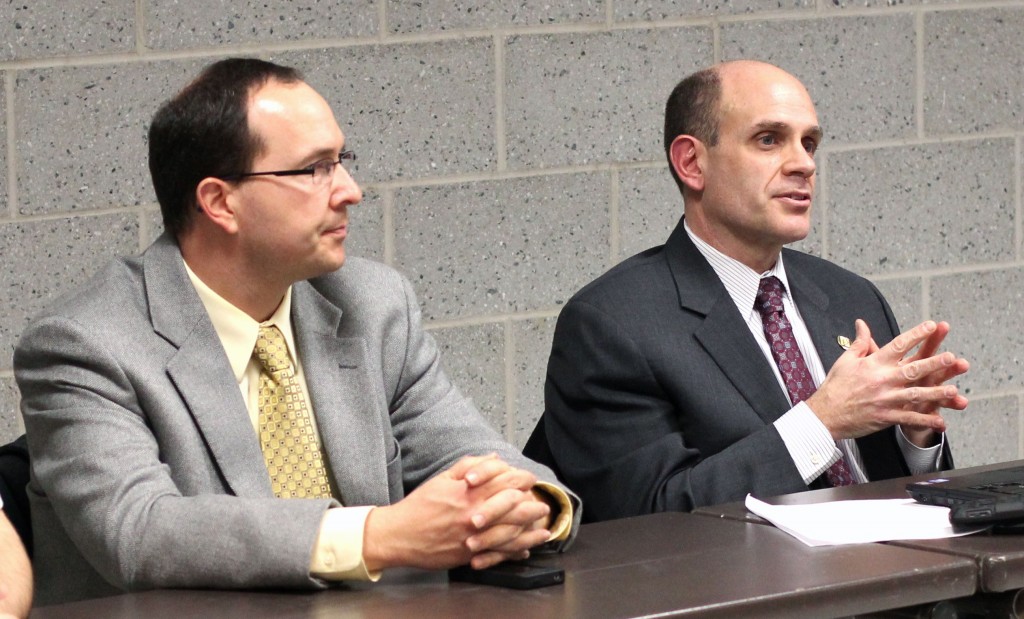
The Provost Search Committee held an open meeting on Thursday in the New University Union to gather student opinions on what they want to see in a new provost — although no Binghamton University students attended the event, including the students on the committee itself.
The committee members in attendance sat on the panel, which included two professors — James Pitarresi, a professor for mechanical engineering, and Sara Reiter, a professor in the School of Management.
Other distinguished faculty members part of the committee included Linda Zanrucha, classified staff member; Mark Reed, associate vice president of Information Technology Services; Paul Parker, associate vice president for research administration; and Scott Geiger, a senior systems administrator. The committee co-chairs — Brian Rose, vice president of student affairs, and Susan Strehle, distinguished service professor of English — were also present on the panel.
The provost’s effect on student life was a central topic of discussion, which highlighted the lack of students present at the event, held from 4 to 6 p.m. on Thursday, Feb. 23.
“It would be nice to have a provost who encourages faculty and students to work harder,” Campbell said. “Students should be encouraged to work, and faculty are expected to have high standards.”
Strehle said the the provost greatly affects the student body.
“The provost is an academic leader, so he or she sets the tone [for Binghamton University] and encourages good teaching, and sets a precedent that teaching actually matters,” Strehle said. “He actually meets with students, listens to what they are concerned with, like class size or living space in the residential communities. I think the provost is really a leader for all.”
Rose encouraged students to get more involved with the search.
“There is an undergraduate and graduate student on the committee, so if there are attributes a student wants to see in a provost, there is no reason they can’t get involved,” Rose said.
Rose opened the meeting by explaining the online submission process for potential candidates. The committee is working with Ilene Negel, a consultant at the outside firm Russell Reynolds, which helps universities find new administrators, including BU President Harvey Stenger.
Stenger has been highly involved with the search thus far, according to Rose. He met with the committee prior to the open meeting to discuss his vision for a future provost.
“I want somebody who complements me,” Stenger said earlier this semester in an interview with Pipe Dream. “I probably have a certain amount of strengths and lack of strengths that I want to complement. So I need to find somebody who is supportive of the things I am trying to do but can also give me some expertise in areas I am not very familiar with.”
The search for the next provost is an open process, meaning that anyone at the University — faculty, staff and students — can submit individuals to be considered for the position.
Several candidates will be chosen from this applicant pool to participate in a series of off-campus interviews. The committee hopes to bring approximately five finalists back to campus. The results of their interviews will be forwarded to Stenger, who will make the final selection.
“The intent of the committee is to bring finalists to campus before the end of the May term,” Rose said. “We are looking between April 30 and May 18, in that window.”
Administrative skills, balancing managerial demands with academics demands, was one of the main criteria discussed at the panel.
Most audience members were in agreement that the provost will need to work on collaborating with all the other vice presidents and the University, from academic departments to the Research Division. They added that research must remain a top priority for BU to continue to be successful.
The provost must also expand BU’s professional offerings, according to David Campbell, associate professor for public administration.
“Sometimes, departments feel that some academics are favored over others,” Campbell said. “The school has made its name in Harpur [College], but the provost must realize the role of the professional schools.”
Many attendees were concerned with how candidates will be chosen from the larger applicant pool. It was generally agreed that to assess a candidate’s attributes, the initial interviews must be tailored to challenge his or her intellect and administrative skills.
“Tough questions are a good approach,” Reed said. “They test the person in a real way, and it helps the committee. There are several skills needed — writing skills and how the person comes across and the résumé — and some serious interviews.”
If the search is successful, there will be a new provost by fall 2012.
To submit candidates for consideration, the provost’s website includes a suggestion box, open to submissions. No other information is required because, as Rose said, the consulting firm wants to make the process as easy as possible. The firm will research the applicants and contact them to see if they are interested in the provost position.


